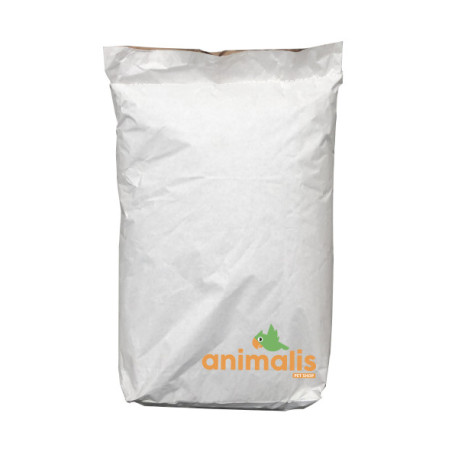- New






Reference: 443-HOE
The milk thistle seed has hepatoprotective properties. It is therefore excellent for our birds to prevent liver problems.
The milk thistle seed possesses hepatoprotective properties. It is therefore excellent for our birds to prevent liver problems as a precautionary measure.
Milk thistle seeds primarily consist of:
- Flavolignans: silymarins, the liver-protecting agents,
- Flavonoids: quercetin, kaempferol, apigenin, etc.,
- Amines: tyramine, histamine, etc.,
- Lipids: fixed oils (30% oleic acid, 6% palmitic acid), phytosterols,
- Carbohydrates (38%),
- Proteins (23%).
Flaxseed is rich in omega 3, which is essential for the cardiovascular system.
Yellow millet is rich in vitamins and minerals and is an alkaline (non-acidic) cereal. It is part of the basic diet of parakeets, exotic birds and exotic doves.
Millet contains magnesium, phosphorus, iron, potassium, manganese, vitamin A, vitamin B1, vitamin B2, vitamin PP (nicotinic acid) and vitamin B5.
Onion seeds are rich in minerals, vitamins, and antioxidants.
Dari, also known as sorghum, millet, is a variety of seeds that is attached to millet varieties. The dari has the size of the hemp seed. The seed is native to the warm regions of Australia, Asia, Africa and South America. There are three varieties: white, yellow and red-brown dari. It should be noted that light dari is given more value than red-brown dari. As far as the food value in particular is concerned, there is not the slightest difference. In addition, the red-brown dari is well appreciated by agapornis. Dari can be compared to wheat in terms of starch content. The seed has a favorable composition of amino acids. The protein present in the dari has a particularly high leucine content.
Chia is sage. It is an annual plant up to 1 m tall whose scientific name is Salvia hispanica.
The composition of chia seed closely resembles that of other mucilaginous seeds such as flaxseeds and psyllium. Unlike flaxseed, however, chia does not have anti-nutritional factors, factors that limit the use of flaxseed without prior hot treatment. Anti-nutritional factors are cyanogenic glycosides or linatins, inhibitors of vitamin B6 that prevent its action. Chia also has a much more pleasant taste than flaxseed and birds consume it more willingly.
Dari, also known as sorghum or millet, is a variety of grain that is related to millet varieties. Dari is the size of a hemp seed. The grain originates from the warm regions of Australia, Asia, Africa, and South America. There are three varieties: white dari, yellow dari, and reddish-brown dari. It is noteworthy that more value is attributed to light dari than to reddish-brown dari. Regarding nutritional value, there is not the slightest difference. Furthermore, reddish-brown dari is well appreciated by lovebirds. Dari can be compared to wheat in terms of starch content. The seed has a favourable composition of amino acids. The protein present in dari has a particularly high leucine content.
High-quality seeds with high fat content
- With a high content of vitamin E, B9, B5, B6, B1, B2, B3, and vitamin K.
- It has antioxidant properties.
- Excellent energy contribution.
- Rich in calcium, potassium, magnesium, phosphorus, proteins, zinc, thiamine, pectin (cleanses the body).
Premium high-quality, high-fat seeds
- With a high content of vitamin E, B9, B5, B6, B1, B2, B3 and vitamin K.
- It has antioxidant properties.
- Excellent energy contribution.
- Rich in calcium, potassium, magnesium, phosphorus, protein, zinc, thiamine, pectin (cleanses the body).
The 1 kg white Perilla from the Manitoba brand is a high-quality food specially designed for birds.
Features and Benefits:
- Natural and Pure: White perilla is a natural, pure, and untreated seed, offering a healthy source of nutrition for birds.
- Rich in Nutrients: It is particularly rich in omega-3 fatty acids, essential for the overall health of birds, especially for their cardiovascular and immune systems.
- Plumage Health: Regular consumption of white perilla helps maintain shiny and healthy plumage thanks to its nutritional properties.
Improves liver and overall health of birds.
Suitable for a wide range of birds, including parrots, canaries, budgerigars, and other exotic birds.
Benefits for birds:
- Liver support.
- Detoxification: Helps eliminate toxins from the liver and improves digestion.
- Strengthening the immune system.
Instructions for use:
Dosage: Add a small amount (usually a teaspoon per day) to the birds' usual seeds. The amount may vary depending on the size and specific needs of the birds. Can be mixed with the birds' daily food.
Precautions:
Store in a cool, dry place, away from moisture and direct sunlight.
The evening primrose is an annual or biennial, rustic, which can be found naturally at the edge of paths near the Atlantic and Mediterranean coasts but also on the embankments of railways. Its erect stems are lined with large rosettes of downy leaves veined with red, between 10 and 30 cm long, oblong in shape, lanceolate, toothed, a little sticky.
Niger, birdseed rich in phosphorus and calcium. Niger seeds (or nyjer seeds) are fine seeds rich in oil. They come from Guizotia abyssinica (also known as Guizotia oleiferous). The niger is highly prized by most birds, goldfinches and siskins love it.
The seed is mainly grown in India, Burma, Ethiopia and Nepal. Niger is an oilseed with a high fat content (38-43%) and protein content (23%). It provides quality food for all species of wild and forest birds, both in dry and sprouted form.
Niger is one of the few birdseeds with a good ratio of calcium to phosphorus.

The milk thistle seed has hepatoprotective properties. It is therefore excellent for our birds to prevent liver problems.
